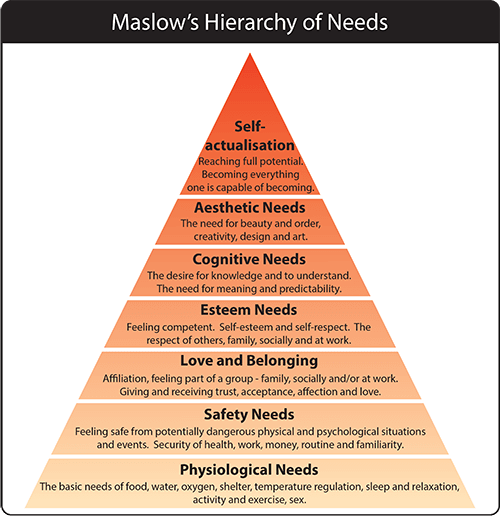Why is Personal Development Important?
There are many ideas surrounding personal development, one of which is Abraham Maslow's process of self-actualisation.
Self-Actualisation
Maslow (1970) suggests that all individuals have an in-built need for personal development which occurs through a process called self-actualisation.
The extent to which people are able to develop depends on certain needs being met and these needs form a hierarchy. Only when one level of need is satisfied can a higher one be developed. As change occurs throughout life, however, the level of need motivating someone's behaviour at any one time will also change.

Self-Actualisation
Maslow (1970) suggests that all individuals have an in-built need for personal development which occurs through a process called self-actualisation.
The extent to which people are able to develop depends on certain needs being met and these needs form a hierarchy. Only when one level of need is satisfied can a higher one be developed. As change occurs throughout life, however, the level of need motivating someone's behaviour at any one time will also change.
- At the bottom of the hierarchy are the basic physiological needs for food, drink, sex and sleep, i.e., the basics for survival.
- Second are the needs for safety and security in both the physical and economic sense.
- Thirdly, progression can be made to satisfying the need for love and belonging.
- The fourth level refers to meeting the need for self-esteem and self-worth. This is the level most closely related to 'self-empowerment'.
- The fifth level relates to the need to understand. This level includes more abstract ideas such as curiosity and the search for meaning or purpose and a deeper understanding.
- The sixth relates to aesthetic needs of beauty, symmetry and order.
- Finally, at the top of Maslow's hierarchy is the need for self-actualisation.
Maslow (1970, p.383) says that all individuals have the need to see themselves as competent and autonomous, also that every person has limitless room for growth. Self-actualisation refers to the desire that everybody has 'to become everything that they are capable of becoming'. In other words, it refers to self-fulfilment and the need to reach full potential as a unique human being. For Maslow, the path to self-actualisation involves being in touch with your feelings, experiencing life fully and with total concentration. Maslow, A. H. (1970), Motivation and Personality, (2nd Edition), Harper & Row, New York. For more on motivation, see our pages: Self-Motivation, Motivating Others and try the How Self-Motivated are You? Quiz.
Maslow (1970, p.383) says that all individuals have the need to see themselves as competent and autonomous, also that every person has limitless room for growth. Self-actualisation refers to the desire that everybody has 'to become everything that they are capable of becoming'. In other words, it refers to self-fulfilment and the need to reach full potential as a unique human being. For Maslow, the path to self-actualisation involves being in touch with your feelings, experiencing life fully and with total concentration. Maslow, A. H. (1970), Motivation and Personality, (2nd Edition), Harper & Row, New York. For more on motivation, see our pages: Self-Motivation, Motivating Others and try the How Self-Motivated are You? Quiz.






